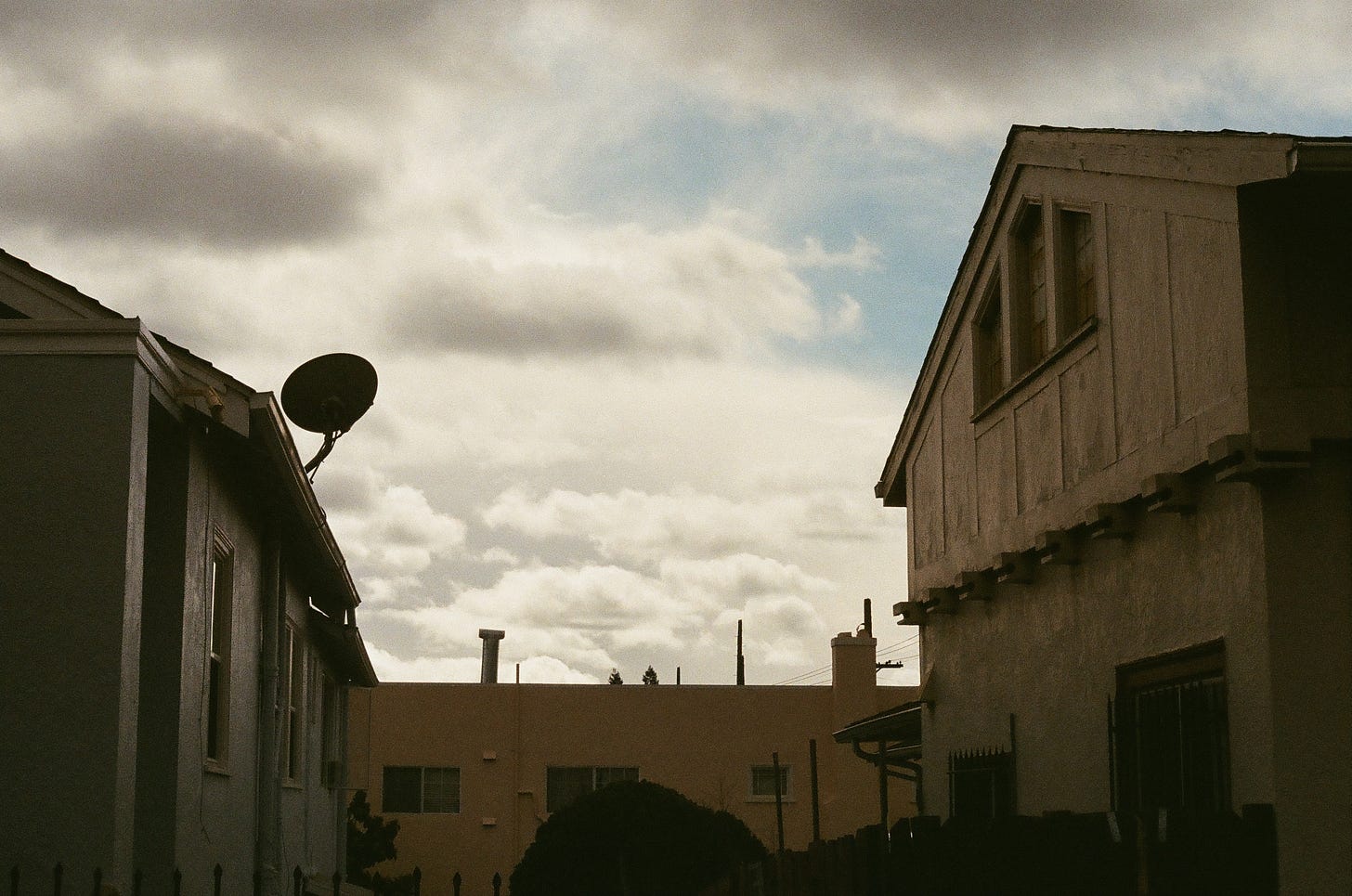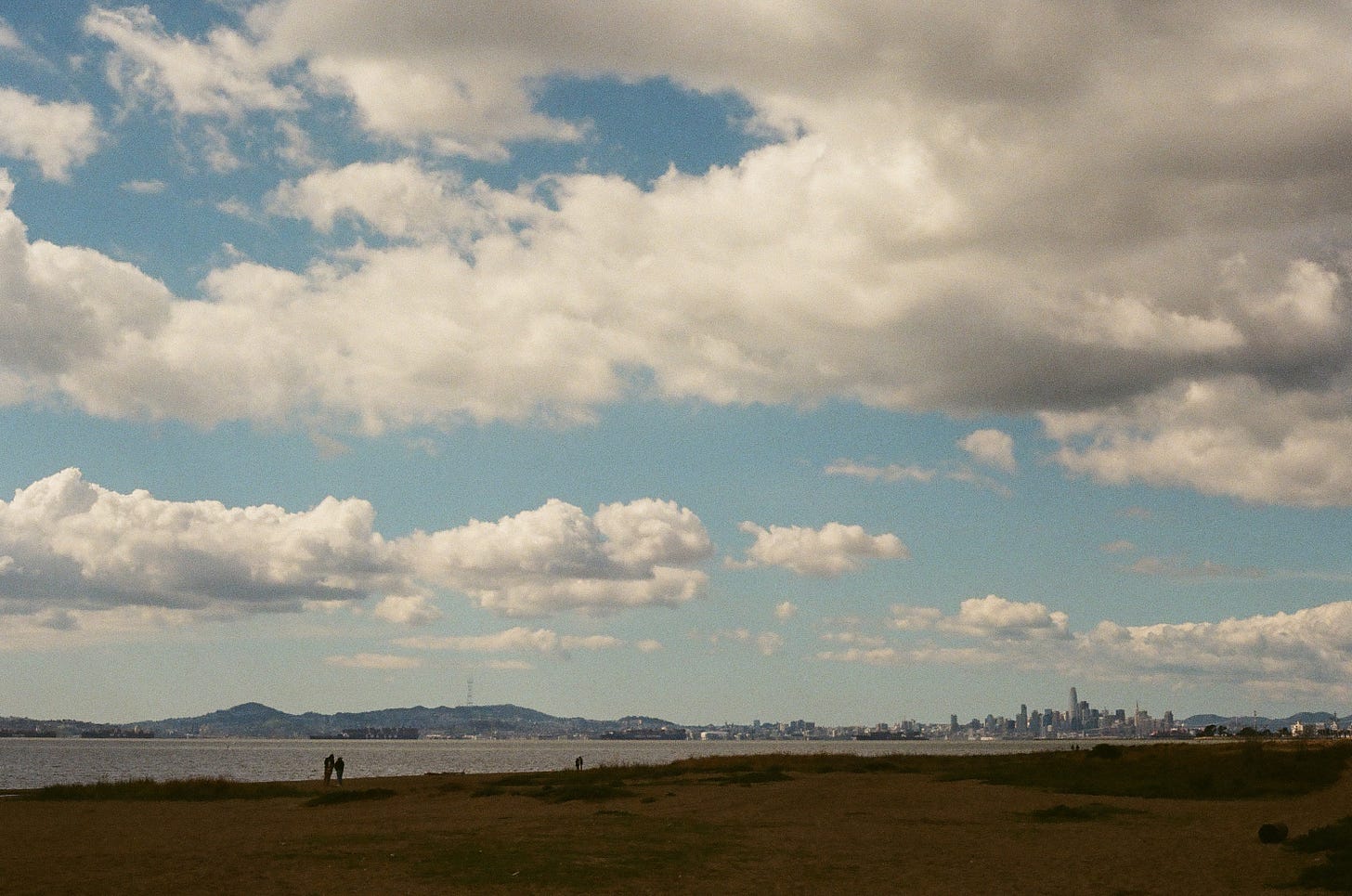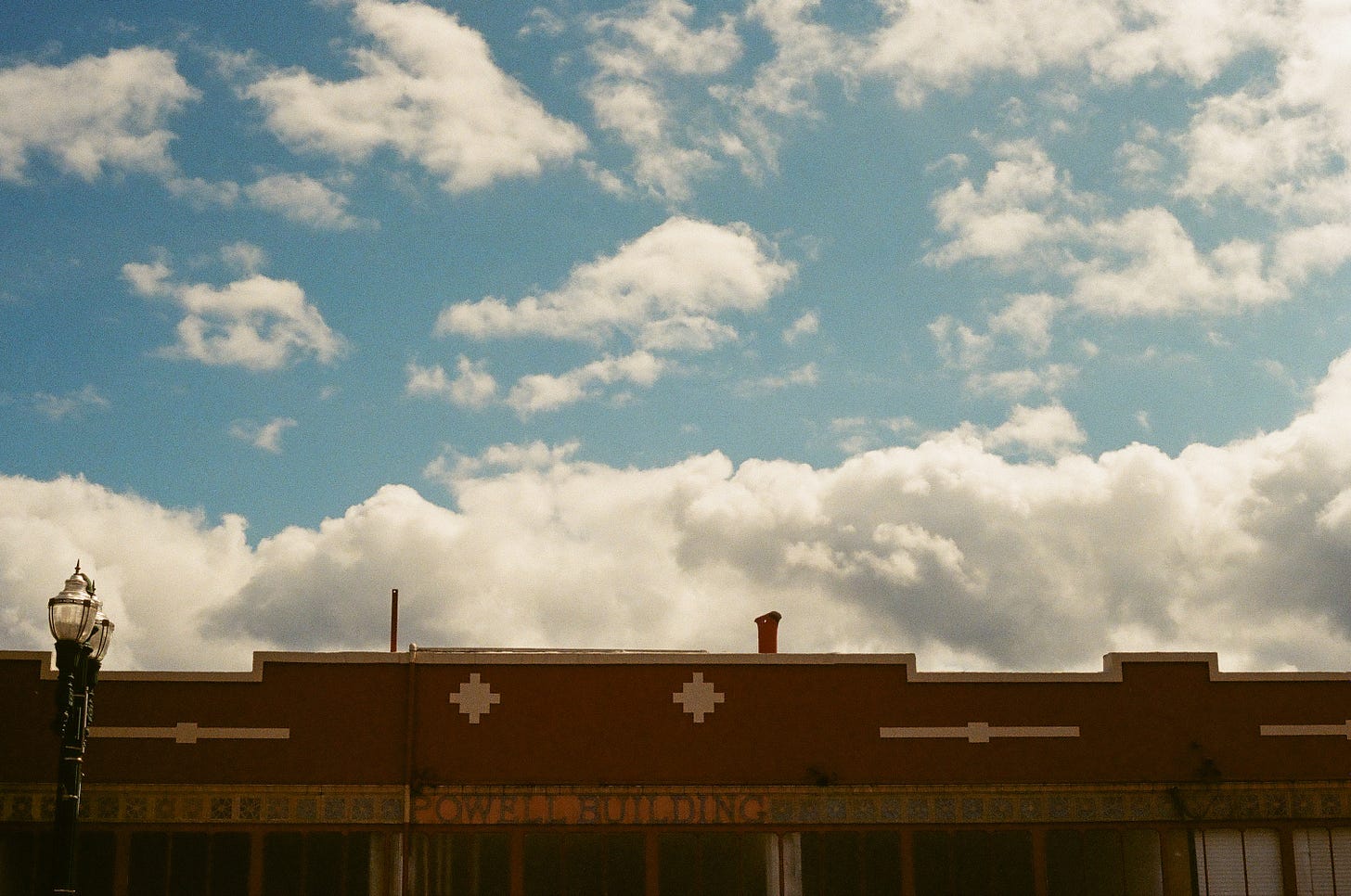A story about the soft stuff.
On adopting Tomato, skies full of clouds, and other tender things.
All of the photos included below were shot on film in the Bay Area — around the neighborhood in Oakland, along the beach in Alameda, on hilly hikes. Prints are available for purchase. Just email me if you’re interested!
Last Saturday — the spring equinox, and the day we went to meet Tomato — the sky was like a pop art pattern, studded with cartoon clouds. It was a 90-minute trip from our place in Oakland to some small nearby town where the two-woman rescue team was based, and I drove, so that Lauren could study for her Javascript exam that was coming up on Monday morning.
She recited her notes out loud as I steered. “Promises encourage writing asynchronous code in a way that appears synchronous. Okay. A promise is pending when it hasn’t been resolved yet. When the promise succeeds, the promise state is fulfilled. When it fails, the promise state is rejected. Got it.” Her words — or the ways they combined — were such gibberish to me, such an unfamiliar language, that they muddled into a soothing backdrop of white noise. Promise, promise, promise.
The pandemic has stripped us of white noise, like it has stolen so many things. The thick silence of one’s home can be stifling; outside, at the grocery store or the park or the farmer’s market, other voices can be tiny alarms, too close, too brash, too careless. White noise, the fuzz of warbled sound that lulls the mind towards presence with itself, has become a rarity. I had forgotten how it could be like a gauze, like a blanket wrapped around my brain to quiet its hurry and soften its sharp edges.
My eyes fixed gently on the highway ahead as we sliced through rolling green hills, resembling Scotland or Ireland or just somewhere Not Here. The watercolor blue above was a bottomless yawn, with its clouds spattered in whopping heaps to convey just how much space there was, just how wide open. You had to gape back at those clouds. They were mammoth, but not menacing, bouncing sunlight at the windshield with their swollen underbellies turned to silver.
“Each promise has a ‘then’ method that handles what happens when the promise transitions out of the pending state,” Lauren read. My thoughts wandered.
Are we ready for this? Can we afford it? Is it too fast? Too huge of a commitment? “He’s just a happy little guy,” the rescue founder had said twice on the phone when she called me four days before, responding to the Petfinder inquiry I assumed would go unanswered, like the rest had. I sifted through a mental list of potential dog names, holding them up to my memory of his face from the online listing, his wide brown eyes and scruffy chin — so serious, so sweet — that had reeled me and Lauren in.
“Promises are eager,” Lauren read, shuffling papers around on her lap. “A promise starts executing code inside as soon as the promise constructor is invoked.” And the sky scrolled by, scrolled by, scrolled by, the clouds suspended like offerings, the present suspended for a moment in the soft space of potential, in the anti-rush that happens when you know you can only be where you are, couched but moving forward.
As our estimated arrival time ticked closer, Lauren tucked her notes away and looked up, leaning forward in the passenger’s seat to snap the sky through the window with her iPhone camera. I asked her why she thinks we’re so naturally enamored with the particular look of a cumulus-laden sky. She theorized that clouds have always been messengers; when have humans not counted on clouds to communicate what’s coming? Clouds have something to say: A storm is approaching; run for cover. Or, You’ll want a sweater. There will be corn and oats and wheat in just a few more weeks. We are biologically built to watch for clouds’ omens.
These ones, the puffy ones, are delightful because they seem playful. They are not warning signals. They are there not for alarm, but for kicks. And with their shapes, they seem to invite a kind of interaction, asking to be read not for weather signal, but for spiritual message. They mean what you want them to mean. That one, a boat. A bear! A dog?
Our agreement was that we would at least meet Tomato, whose name was Kaleb at the time, because we couldn’t not meet him. As far as we could tell from afar, he was perfect, and if we didn’t meet him, we’d always wonder. Before we officially signed anything, we would ask for 10 or 15 minutes to take a walk, just to be certain, and if we weren’t totally sure, then he wasn’t ours, and we’d wait and consider adopting a different dog, a different year.
And then, we pulled up to the adoption center’s address, which was planted in the country amongst assorted fruit orchards and cow pastures, between countless t-shaped intersections. We saw him bounding around a corner, grinning back at the woman holding his leash and bouncing forward like he knew exactly what was about to happen, before I had even shifted gears into park. And the decision made itself. But if we needed confirmation, there was his soft nuzzle into our legs as we stepped out onto the gravel driveway, and the calm but curious way he watched the quacking ducks waddle across the lawn as he patiently waited for us to say “yes,” and his goofy leap into the air as we nodded, and how he molded into our arms the moment we picked him up to carry him to the car, everyone melting.
Here are some things you should know about Tomato, since he’s part of the family now. He hasn’t met you, but he wants to, the way he wants to meet each passing stranger (human and otherwise) on the opposite side of the street. His only nemeses are squirrels, and he halts on every walk past a specific tree outside the neighborhood’s elementary school where the most rodents seem to live and eat, challenging them to staring contests that he never manages to win. Which is fine. He doesn’t much care about winning, just playing. He jolts gleefully ahead, smiling at you, at himself. He cannot walk in a straight line, because there is too much to see, too much to smell. Perhaps the reason he is not especially interested in chew toys or balls is because every sidewalk strikes him as the most fascinating amusement park.
He is particular. He will only pee in the perfect spots, and he will eat around the cooked carrots or spinach in the bowl to get to the good stuff — today, oats and chicken, but tomorrow, we’ll see. He’s polite, though. He’s not a whiner. He just knows what he likes and where he wants to go.
He growls at his own reflection — in the mirror and in shiny windows and even in a locked phone screen — but at nothing else, except for the other day when he grrred as he kicked up some grass, post-pee, with particular enthusiasm.
He is scared of the trash truck, startled by loud noises, but bounces back from his recoiled posture like a resilient slinky. I think he inherently trusts the world.
He cuddles like a human, not a dog, with his little legs outstretched and his chin perched on your shoulder. By sundown, this is all he wants to do. He’ll take any couch, but he prefers the plush velvet one by the front window, where the view’s good. The bed is best, though, especially if it’s piled with clean laundry he can snuggle into.
Nobody who meets him can tell whether he’s a puppy or an old man. The answer is, both at the same time. The technical answer is that he’s two and a half. According to his papers, he’s a quadruple Virgo with a Pisces moon, which explains everything.
We named him Tomato for a simple reason, really, which is that we both love tomatoes. Lauren has always adored them, like she savors all foods with a kick of acidity. They remind her of the Persian cooking she grew up on. For me, tomatoes are Italian; I didn’t know I adored them until 2016, when I started my farming journey that returned me to myself. Throughout my first few sweaty work weeks, I munched on cherry tomatoes like vine-grown candy, their juice dripping down my skin, and the exhilaration was almost too much to bear.
At Myrtle Glen Farm, where we spent more than five months of the pandemic, I got to watch Lauren discover the unbeatable delight of the tomato harvest, in all of its weighty bounty. “Look at this one!” she’d shriek from the opposite side of the hoop house. “Baby! Look!” A bulbous crimson; a shiny gold nugget; one red and meaty as a heart. Tomatoes feel symbolic of joy and nourishment and embodied abundance, of sweet mess, of summer warmth; they are ripe when they’re soft to the touch.
All of this is to say: I have been thinking a lot about softness.
I’ve been thinking about softness as Tomato flips onto his back like a bug, patiently awaiting another round of belly rubs. I step away from my laptop to oblige. His fur is velvet in the tender places: under his chin, behind his ears, at his armpits. (I did just call them armpits, yes.)
I’ve been thinking about softness as I watch myself move through my work weeks differently with a dog in the house — I am calmer and more present, and curiously more productive. I procrastinate less. When I am soothed, I can actually do what I say I will do. A softened, settled nervous system really does function better than a stressed and agitated brain. (Stress is a lie we tell ourselves about productivity. Softness is generative.)
I’ve been thinking about softness as I wear the bathrobe that Lauren got me. I kept complaining about being cold, and my sister suggested investing in a robe, which quite honestly hadn’t occurred to me. Aren’t robes for spa people? For, like, people who nap? Lauren gave me a plush, terry cloth robe for my birthday, and I am a robe person now. As I step out of the shower, I swaddle it around my damp body, and I become a plump, pink cloud of cozy warmth. Sometimes I wear the robe for an hour before I get dressed — I make breakfast, check emails, pour the steaming kettle into the French press with my thick sleeves lolling around my wrists — and it makes me feel regal. I deserve this small luxury. My skin deserves soft things.
“You deserve only softness,” Lauren says, her eyes fixed on mine. We are emerging from a fight that was really just an exhaustion-induced moment of miscommunication, one that stripped us down to our sharp edges. She places a palm on my heart. Lauren teaches me softness all the time, showing me how softening is the step forward.
I’ve been thinking about softness as I continue to question my relationship with social media and the role that I want it to play in my life and work. In the past couple weeks of nauseating news — of horrifying deaths by gun violence and toxic racism, of inexcusably senseless anti-trans legislation, of atrocity, atrocity, atrocity curdling the sweet milk of more hopeful stories — I have found myself recoiling from Instagram, too overwhelmed by all if its shouting to make meaning of much of it, too emotionally activated by the fast influx of noise to actually know what to say. I’ve been trying to engage with mass traumas more softly. I’ve been focused on thinking reflectively instead of reactively, on exchanging ideas through one-on-one conversations instead of postulating from a “platform,” on respecting when my nervous systems tells me it has had enough for now. I’m trying to find space for softness in the hard stuff of activism.
And I’ve been thinking about softness as the sun pours across my face, painting me with the soft outline of a mask tan. It is spring. The days are longer and warmer and brighter. My golden beets are a rave of neon, dancing in their backyard garden bed. I am one-half vaccinated and contemplating the potential of a vacation with my family in a few months. But I can’t imagine not remaining edgy and rigid in a crowd, not jolting sharply (like Tomato does when he hears the rumble of a trash truck) when a stranger steps a little too close.
What if we can only be where we are, suspended here? What if we can hold awareness of the future that’s coming — the certainty of that — without trying to preemptively draw its strict outlines, without anticipating it anxiously, without hurrying towards it or holding back from it, without interpreting its ever-rolling arrival as ominous?
What if softness is how we get there? What if “we’ll see” — and the trust that this waiting and witnessing requires — keeps us just tender enough?








